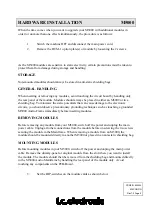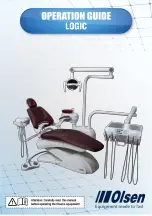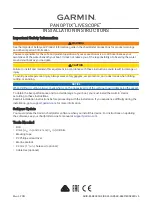
Page | 36
A.1
–
Recommended Maintenance items
Hi-
cap “N”
stoner are designed to give years of trouble-free service. However,
as with all machinery, periodic maintenance is required to keep it in top condition.
The following is a list of some areas that can be problems, if not periodically checked.
A.1.1
–
The Deck
To maintain optimum product flow, the deck should be checked frequently and
cleaned or repaired as needed. Even in very clean atmospheres, dust and dirt will
build up on the underside of the deck. This causes a restriction of air flow through the
deck and will eventually plug the deck completely (blinded deck). When the deck
becomes plugged, it will be necessary to remove it from the machine and thoroughly
clean it. A deck that is only partially cleaned will become plugged sooner. To check if
a deck is clean, place a light on a drop cord under the deck. If the deck is clean, you
should be able to see light through every opening of the deck cover. Dirty areas will
show up as dark spots and should be cleaned more thoroughly.
Because decks are in direct contact with the product, they are subjected to abrasive
wear. Inspect your deck frequently for wear. As a deck wears out, the surface becomes
smoother and it becomes more and more difficult to move product along the deck.
Figure 15: New deck vs. worn deck
Normally, when the wires of the deck overcover are worn halfway through, it is time
to repair the deck. If the deck cover is worn completely through, there is danger of
Summary of Contents for Hi-Cap N Series
Page 6: ...Page 6 ...
Page 34: ...Page 34 this section intentionally left blank ...
Page 35: ...Page 35 V Appendices Appendix A Maintenance and Basic Troubleshooting ...
Page 41: ...Page 41 Appendix B The ABB ACS380 VFD ...
Page 43: ...43 P a g e Figure 17 VFD keypad display ...
Page 44: ...44 P a g e Figure 18 VFD keypad status line ...
Page 47: ...47 P a g e A 2 Programming the VFD from the Keypad Figure 20 Changing VFD parameters ...
Page 49: ...49 P a g e ...
Page 50: ...50 P a g e Appendix C Timer manual ...
Page 51: ...51 P a g e C 1 Getting to know timer operation ...
Page 52: ...52 P a g e C 2 Timer dip switch selection ...
Page 53: ...53 P a g e Appendix D Electrical and Dimensional drawings ...
Page 54: ...Page 54 D 1 Electrical drawings ...
Page 55: ...55 P a g e ...
Page 56: ...56 P a g e ...
Page 57: ...57 P a g e D 2 DIMENSIONAL LAYOUT DRAWINGS ...
Page 58: ......
















































